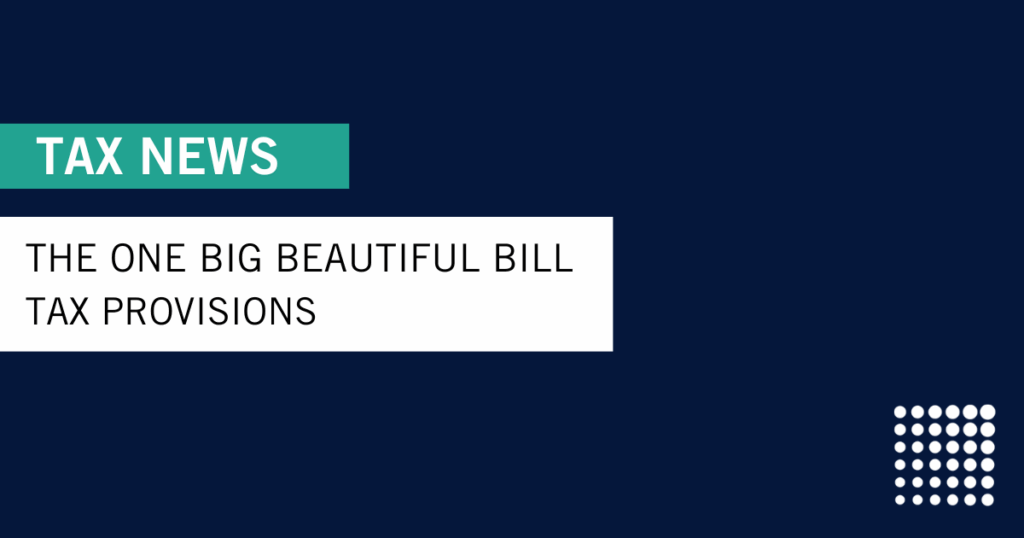The Consolidated Appropriations Act’s tax provisions impacting you
In late December of 2020, the Consolidated Appropriations Act (CAA) became law. Although most of the news surrounding the CAA was focused on the Economic Aid Act, Second Draw PPP or stimulus checks, it also brought changes that will impact small businesses tax liability in 2020 and 2021.
The CAA offers provisions enhancing the Employee Retention Credit (ERC), allowing taxpayers to fully deduct expenses paid for with forgiven Paycheck Protection Plan (PPP) loan proceeds, and extending dozens of valuable expiring tax provisions. Also impacted, the 50% disallowance for business meals.
CPA and Financial Planner Julie Denham has been following the legislation since the beginning and is encouraged by the changes and how they will impact taxpayers.
“The Consolidated Appropriations Act included a lot of changes—and we’ve been laser focused on combing through it to ensure we are able to guide our clients on the pieces that will have the biggest impact on both their business and taxes.”
Change 1:
QUALIFIED PAYCHECK PROTECTION PROGRAM (PPP) EXPENSES ARE NOW TAX DEDUCTIBLE
Congress voted to overrule the original IRS ruling stating that forgiven PPP loan proceeds would be non-deductible. This makes all qualified PPP expenses deductible, essentially making 100% of PPP proceeds tax-free. This is a major tax break for 2020.
For most flow-through entities such as LLC, S-Corporation or Schedule C, this lowers your 2020 estimated tax liability by your effective tax rate, multiplied by your total PPP loan.
For example, if you received a $100,000 PPP loan, your 2020 taxes will decrease by approximately $40,000 assuming you are in the 35% federal and 5% state tax brackets. There is nothing you need to do in order to deduct your qualified PPP expenses in 2020. For CWA clients who operate as a C-Corporation, check with your CWA planning team to determine how this will change any year-end bonus plans you may have already made.
CWA Comments:
For most CWA clients, you may now be looking at a large refund for 2020. Consult with your CPA on these changes and how this could change your tax projections. Keep in mind this could also potentially reduce or eliminate the need for a 2020 extension payment (due 4/15/2021).
Change 2:
BUSINESS MEALS DEDUCTION INCREASED TO 100%
The 50% disallowance for business meals is eliminated in 2021 and 2022 only, allowing business meals to be 100% deductible. This was placed in the bill to help the struggling restaurant industry. Business owners will now receive a full deduction in 2021 and 2022 for all staff, colleagues and referrals business meals.
CWA Comments:
Entertainment expenses, like a sporting event or tickets to a show, are still non-deductible. Make sure you keep all itemized receipts for any business meals. The IRS will be strict when entertainment is involved, so if you pay for a skybox suite, which is non-deductible, if you have an itemized receipt for the food costs, you can still deduct the food and beverage only from this event. The IRS does state that business meal costs cannot be “lavish or extravagant”, leaving some grey area here.
Change 3:
Employee retention tax credit (ERC) modifications
The CAA changes are retroactive to March 12, 2020 and extend the ERC from December 31, 2020 until June 30, 2021. The most significant change allows borrowers under the Paycheck Protection Program (PPP), the ability to claim the ERC credit for 2020 and 2021. While this presents an opportunity for clients to recoup some of their payroll costs via a tax credit, the CAA stipulates that you cannot duplicate payroll expenses for the ERC and the forgiveness of loan proceeds under the PPP.
The CAA further modified the calculation of the credit originally included in the CARES Act. However, it is important to note the changes to the calculation do not apply to 2020 but rather only apply to 2021 credit calculations. Any credit taken for 2020 under the new act will still be calculated using the criteria under the CARES Act.
The ERC will impact your business if you fall into one of the two criteria during 2020:
- Operations were fully or partially suspended by government order; or
- Collections dropped by 50% or more for any quarter in 2020 when compared to 2019
The CAA also made changes to the calculation of the ERC that only apply to Q1 and Q2 2021. An employer will qualify if collections from Q1 or Q2 of 2021 decrease by 20% or more compared to the same quarter(s) in 2019. If the employer was not in business in 2019, then the employer can use the same quarter(s) in 2020.
Assuming you meet the collection criteria, the ERC is calculated as 70% of qualified wages up to a maximum of $10,000 per employee per quarter. The CAA increases the applicable percentage from 50% to 70% and makes the credit available per employee, per quarter.
CWA Comments:
The CAA has created an opportunity for clients to recapture some of the costs incurred for employee wages if you qualify under the ERC regardless of whether you received a PPP loan. Since most practices had a government mandate to partially shut down, we believe most clients will qualify. When evaluating whether to pursue the ERC, pay close attention to ensure that wages are not being counted for both the ERC and the forgiveness of the loan under PPP.
For full details on the ERC changes impacting 2020 and 2021 tax credits and how to calculate your tax credit, read our full blog on the topic.
This new law is complicated, but Julie wants all her clients to know that CWA is committing to getting it right.
“We are all over this. Not only are our CPAs spending hours reviewing, but we’ve been working with different lenders and the SBA to make sure we understand the new tax law changes and how it will impact our clients going forward,” Julie states. “We want to take the heavy lifting off our clients so they can enjoy the provisions of the bill and get back to focusing on their business during these crazy times. “
Everyone’s situation is unique. Contact your CPA or advisor to review how these changes may impact your tax strategy.














